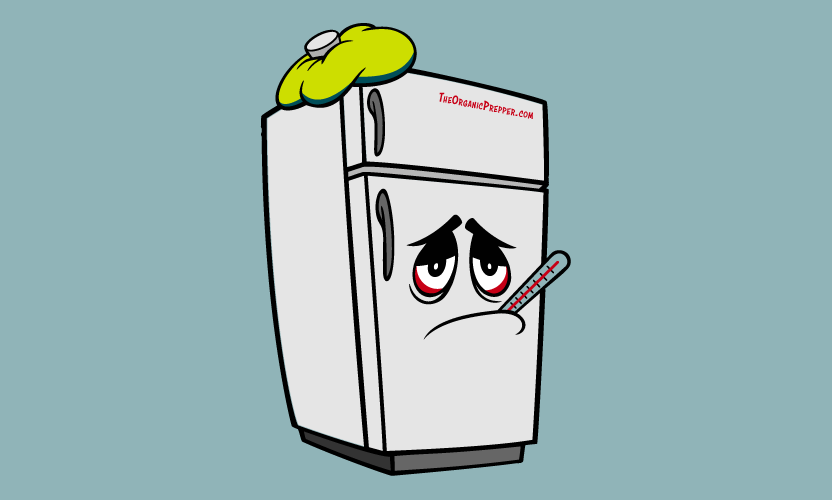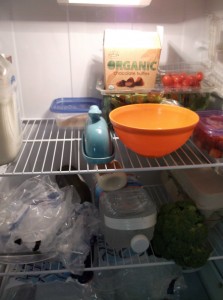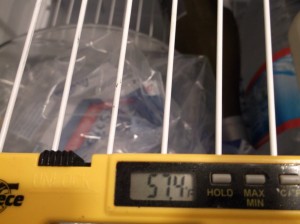If you're new here, you may want to subscribe to my RSS feed. Thanks for visiting!
Author of Be Ready for Anything and Bloom Where You’re Planted online course
Looking for a fun way to spend this hot summer week? I’m just going to go out on a limb here and say that spending it without a working refrigerator is NOT it.
A few years ago I was out for the day. I got home and opened the fridge and grabbed a drink. I though, “Hmm….that isn’t very cold.”
And indeed it was not, because my refrigerator had stopped working properly sometime earlier that day. Because of the 4th of July weekend, I wasn’t able to get anyone to come and repair it until Monday. Then, after it was diagnosed, a part had to be ordered which will not arrive until tomorrow. So there you have it…a solid week in 90+ weather with no fridge.
In a power outage situation, this is not an unlikely scenario at all. So in the spirit of making this a “chance-to-practice-preps” experience instead of a “dad-gum-it- I-had-to-throw-out-a-bunch-of-groceries” experience, here’s what I learned.
Food safety rules
I was absolutely loathe to throw away groceries, but after having a recent bout of food poisoning after a dinner out, I wasn’t will to take any chances. The dog thoroughly enjoyed her bowl of roast beef with potatoes and carrots though.
FoodSafety.gov offers these guidelines:
Is food in the refrigerator safe during a power outage? It should be safe as long as power is out no more than 4 hours. Keep the door closed as much as possible. Discard any perishable food (such as meat, poultry, fish, eggs, and leftovers) that have been above 40 °F for over 2 hours.
Never taste food to determine its safety! You can’t rely on appearance or odor to determine whether food is safe.
Note: Always discard any items in the refrigerator that have come into contact with raw meat juices.
You will have to evaluate each item separately. Use this chart as a guide.
Food Categories Specific Foods Held above 40 °F for over 2 hours MEAT, POULTRY, SEAFOOD Raw or leftover cooked meat, poultry, fish, or seafood; soy meat substitutes Discard Thawing meat or poultry Discard Salads: Meat, tuna, shrimp, chicken, or egg salad Discard Gravy, stuffing, broth Discard Lunchmeats, hot dogs, bacon, sausage, dried beef Discard Pizza – with any topping Discard Canned hams labeled “Keep Refrigerated” Discard Canned meats and fish, opened Discard Casseroles, soups, stews Discard CHEESE Soft Cheeses: blue/bleu, Roquefort, Brie, Camembert, cottage, cream, Edam, Monterey Jack, ricotta, mozzarella, Muenster, Neufchatel, queso blanco, queso fresco Discard Hard Cheeses: Cheddar, Colby, Swiss, Parmesan, provolone, Romano Safe Processed Cheeses Safe Shredded Cheeses Discard Low-fat Cheeses Discard Grated Parmesan, Romano, or combination (in can or jar) Safe DAIRY Milk, cream, sour cream, buttermilk, evaporated milk, yogurt, eggnog, soy milk Discard Butter, margarine Safe Baby formula, opened Discard EGGS Fresh eggs, hard-cooked in shell, egg dishes, egg products Discard Custards and puddings, quiche Discard FRUITS Fresh fruits, cut Discard Fruit juices, opened Safe Canned fruits, opened Safe Fresh fruits, coconut, raisins, dried fruits, candied fruits, dates Safe SAUCES, SPREADS, JAMS Opened mayonnaise, tartar sauce, horseradish Discard if above 50 °F for over 8 hrs. Peanut butter Safe Jelly, relish, taco sauce, mustard, catsup, olives, pickles Safe Worcestershire, soy, barbecue, hoisin sauces Safe Fish sauces, oyster sauce Discard Opened vinegar-based dressings Safe Opened creamy-based dressings Discard Spaghetti sauce, opened jar Discard BREAD, CAKES, COOKIES, PASTA, GRAINS Bread, rolls, cakes, muffins, quick breads, tortillas Safe Refrigerator biscuits, rolls, cookie dough Discard Cooked pasta, rice, potatoes Discard Pasta salads with mayonnaise or vinaigrette Discard Fresh pasta Discard Cheesecake Discard Breakfast foods –waffles, pancakes, bagels Safe PIES, PASTRY Pastries, cream filled Discard Pies – custard, cheese filled, or chiffon; quiche Discard Pies, fruit Safe VEGETABLES Fresh mushrooms, herbs, spices Safe Greens, pre-cut, pre-washed, packaged Discard Vegetables, raw Safe Vegetables, cooked; tofu Discard Vegetable juice, opened Discard Baked potatoes Discard Commercial garlic in oil Discard Potato salad Discard Casseroles, soups, stews Discard
The one guideline I felt comfortable not following was the eggs. Mine came straight from the chicken that day, and since they could have been sitting under a hen for another 10-12 hours, I was willing to take the risk. The rest of the items had to go, unfortunately.
Damage control
Had I been home and realized there was a problem in time, I would have immediately canned, cooked, or otherwise preserved the food in my refrigerator. Click HERE to learn how to can your own recipes.
Since this is not an area-wide power outage, I have access to ice. The freezer works somewhat so I am able to make more ice. I’m keeping delicate items in the freezer, like milk, mayonnaise, and meat. (I have been buying about 2 days’ worth of fresh items at a time for the past week.)
Basically, a refrigerator that doesn’t work can be used like a large, standing cooler. If you keep replenishing the ice, you can keep things at a moderate temperature. Here is a picture of my fridge. You can see the large blocks of ice on the sturdy bottom shelf, and bowls of ice on the other two shelves.
Unfortunately, it still isn’t that cold, so I’m using it for drinks, butter, veggies, fruit, hard cheese, and my beloved chocolate.
Here’s the ambient temperature in the fridge after having the door open for a moment to get this photo. This is with all of the ice in it.
Keeping your food cool during power outages
In a grid-down situation, things would be different. I am able to use my freezer sort of like a cranky refrigerator as long as I don’t mind things potentially getting partially frozen. As well, I have easy access to ice as near as the closest gas station.
For keeping your food safe during a power outage, take these steps to be prepared:
- Use your deep freezer to freeze gallon bottles of water (leave space for expansion). You can use these to keep the contents of your refrigerator cool.
- Have a cooking method that does not require grid power in case you need to can your perishable food.
- Print out the food safety guidelines above and keep them near the fridge. If you have no grid, you won’t be able to access the list on the internet.
- If you don’t already have one, invest in a thermometer for your refrigerator so that you can monitor the temperature.
- Store food in ways that are not grid-dependent: dehydrate or can when possible.
- Learn how to make a clay pot refrigerator (and get all of your supplies)
When in doubt, throw it out. Food poisoning is horrible, and can even be deadly. It’s just not worth it.
In a long-term scenario, it would be an entirely different ballgame. We’d begin to rely on the methods our ancestors used: we would cook only amounts that could be immediately consumed or items that did not require refrigeration of the leftovers. As well, we’d eat more fruits and vegetables in hot weather. Learn more about surviving in a long-term off-grid scenario HERE.
As for me, a part has been ordered and I had a working fridge the following afternoon. It took a little extra work, what with shuffling ice back and forth between the fridge and freezer, but, in the grand scheme of things, it was only been a blip on the radar, aside from the loss of some food.
What about you?
Have you ever lost food during a power outage? What did you learn? What is your refrigeration plan in the event of a summer power outage?


















Hey Daisy, YES I do remember losing power for 9 days in Kissimmee, Fl. due to a terrible hurricane that came through there. The lines were damaged, some even on the ground. We were without any power at all for 9 full days until it was restored thus losing ALL of the food in the frig. Bagged it all up and threw it in the dumpster at the complex where I was living at that time. It was horrible.
Then my friend Bruce told me that he was going to sign up for aid from FEMA, and encouraged me to do that also, and I did.
FEMA send me a check for $300.00 to replace all of the food that I lost which was everything that my freezer and frig would hold.
The Salvation Army food truck parked in front of the mall and were feeling people 2 meals a day and the city of Kissimmee was passing out bottled water for free for that time. You can go ever 2 days for free water and you could eat everyday for free so thank GOD for that. ALL was not lost b/c some good did come out of it in the end but it was a very scary, aggravating experience seriously.
Commercial American eggs have to be discarded if left out for more than a few hours, but that’s because they are scrubbed, and that removes the natural coating which protects them from infection. Home-grown, unwashed eggs, which includes eggs in other countries – or so I’ve read – do not require refrigeration. As you observed, they may be sitting under the hen for quite a while before you bring them in the house.
I was also shocked to discover that butter doesn’t require refrigeration. All those childhood injunctions have stuck with me, so now we leave our butter out, making it much easier to spread. And giving me mild anxiety every time I remember my mother’s injunction to refrigerate it.
Ah! You got there before me. Very true.
If it were me, I would move the items you wanted to keep cold into a cooler with some ice—a smaller space would be easier to chill.
butter will keep at least a week on the counter in a “butter bell”. you squash the cube of butter into the cup of the bell and then invert it into the slightly larger cup which has water in the bottom. the water covers the surface of the butter, preventing oxidation (rot).
i wonder how our ancestors survived–were they a lot tougher than us? my granny didn’t have electricity when my mom and here siblings were growing up. if they managed to have more meat than would be eaten in one meal, it was placed on the counter under a clean cloth. my mother remembered asking to have a slice of such a treat and granny told her yes but don’t eat that green part near the bone….
Butter will keep at least a week on the counter without a butter bell. I keep a stick of butter out until it’s gone and have done this for the last 20 years. Only one time did the butter go bad.
I do this, too, Marie. Of course, butter never lasts long in our house. 🙂
Neat picture. I had one like that.
No. I won’t say how many years ago it was.
I’ve also gone through days without electricity and had to toss everything. But several times my refrigerator has had mechanical problems which were fixable, just not within 4 hours. I got tired of loosing everything, so we bought a small frig at Walmart. It will actually hold the necessities; in fact, I could survive with just this dorm-size model if I needed to. Meanwhile my full-size model got scared and hasn’t misbehaved. I guess we put the fear of the trash heap into it. Anyway, a small extra frig is a good investment; also a great place to store extra drinks, etc.
Same thing happened to us and we got the full sized dorm fridge and had it running in our kitchen for a few days while the main fridge awaited repairs. We also had a freezer failure, but we were lucky that a dry ice company was open on a Sunday and we were able to get enough to keep things cold until a new unit could be delivered. That and I have enough ice chests that I could store everything from the freezer in the ice chests the morning of the freezer swap…I have ice chests of varying sizes so I can take the perfect size on any given trip and not have wasted space. I think I’m up to 7 ice chests from six pack sized, to mini-coffin sized. 😛
Regarding eggs, you can keep them for weeks on the shelf without harm, if you store them without washing them. Many countries store them unwashed on shelves even in their most high class grocery stores. This includes Japan, which is known for its cleanliness of its foodstuffs. The shelf life is greatly increased if you don’t wash off the natural protective shell coating until just before washing.
Can you also coat the eggs with an oil so they’ll last even longer??
You can indeed, some people do preserve eggs in oil. There is also a solution you can buy and mix up called “water glass” that you can preserve fresh, unwashed eggs. One of the cheapest waterglassing solutions to use is hydrated lime and water, and there are several articles online on how to do this. Eggs preserved this way have been known to last up to two years. My folks did it when I was a kid and we were living without running water, refrigeration, or sewer service.
In a normal power loss scenario I’ll rely on the generator to keep things running for a week or so if necessary. If we’re talking grid-down/EMP scenario where electronics are fried, then it’s back to no refrigeration outside of winter, although the basement is always cooler than the rest of the house. So I plan on using up food as it’s opened. Although I can keep food hot in the Sun Oven all day, so a casserole made in the morning will be good through supper as long as we have mostly sunny skies. But since some of my FD food is in #10 cans which can’t be finished in one sitting, I have silica gel packs to keep the moisture down. And for the larger pouches of FD or dehydrated food, I have lots of ziplock bags that I can use with the silica gel packs to seal things up and keep them for a few days while we use the food up. The silica gel packs will recharge nicely in the Sun Oven assuming I keep an eye on it to make sure temperature doesn’t get over 250-275F.
For fresh food harvested from the garden, I have a pressure canner that can be used over a fire and lots of canning jars and lids. Although I do need to buy some Tattler reusable lids in case of a long term disaster. And I can use the Sun Oven to dehydrate anything I can’t can in jars. To store dehydrated items I have both the ziplock bags for short term storage and canning jars with a brake bleeder to pull a vacuum for longer storage. Right now I use the FoodSaver appliance to vacuum seal the jars, but I got a brake bleeder that is only used for manual vacuum on food jars…
I’d do what Dick Proenneke did in Alone In The Wilderness. He cut the side off a metal gas can, but some sort of larger tin would work. He buried it in the ground in a shaded area. He then covered it with moss. He kept a thermometer in there, too. It stayed significantly cooler and at a consistent temperature in the ground.
I think that this is why so many “antique homes” kept their root cellars. Even now, a root cellar has a lot of uses. I’ve seen a Swedish model made out of heavy plastic that can be buried quite easily and is useful for even milk and eggs. (Of course, it’s Sweden-YMMV in Arizona!) Having an alternative to the electric fridge is something that every prepper should contemplate.
Do you have a link for that particular root cellar?